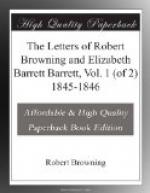had my heart in books and poetry, and my experience
in reveries. My sympathies drooped towards the
ground like an untrained honeysuckle—and
but for
one, in my own house—but
of this I cannot speak. It was a lonely life,
growing green like the grass around it. Books
and dreams were what I lived in—and domestic
life only seemed to buzz gently around, like the bees
about the grass. And so time passed, and passed—and
afterwards, when my illness came and I seemed to stand
at the edge of the world with all done, and no prospect
(as appeared at one time) of ever passing the threshold
of one room again; why then, I turned to thinking with
some bitterness (after the greatest sorrow of my life
had given me room and time to breathe) that I had
stood blind in this temple I was about to leave—that
I had seen no Human nature, that my brothers and sisters
of the earth were
names to me, that I had beheld
no great mountain or river, nothing in fact.
I was as a man dying who had not read Shakespeare,
and it was too late! do you understand? And do
you also know what a disadvantage this ignorance is
to my art? Why, if I live on and yet do not escape
from this seclusion, do you not perceive that I labour
under signal disadvantages—that I am, in
a manner, as a
blind poet? Certainly,
there is a compensation to a degree. I have had
much of the inner life, and from the habit of self-consciousness
and self-analysis, I make great guesses at Human nature
in the main. But how willingly I would as a poet
exchange some of this lumbering, ponderous, helpless
knowledge of books, for some experience of life and
man, for some....
But all grumbling is a vile thing. We should
all thank God for our measures of life, and think
them enough for each of us. I write so, that
you may not mistake what I wrote before in relation
to society, although you do not see from my point
of view; and that you may understand what I mean fully
when I say, that I have lived all my chief joys,
and indeed nearly all emotions that go warmly by that
name and relate to myself personally, in poetry and
in poetry alone. Like to write? Of course,
of course I do. I seem to live while I write—it
is life, for me. Why, what is to live? Not
to eat and drink and breathe,—but to feel
the life in you down all the fibres of being, passionately
and joyfully. And thus, one lives in composition
surely—not always—but when the
wheel goes round and the procession is uninterrupted.
Is it not so with you? oh—it must be so.
For the rest, there will be necessarily a reaction;
and, in my own particular case, whenever I see a poem
of mine in print, or even smoothly transcribed, the
reaction is most painful. The pleasure, the sense
of power, without which I could not write a line,
is gone in a moment; and nothing remains but disappointment
and humiliation. I never wrote a poem which you
could not persuade me to tear to pieces if you took
me at the right moment! I have a seasonable
humility, I do assure you.




